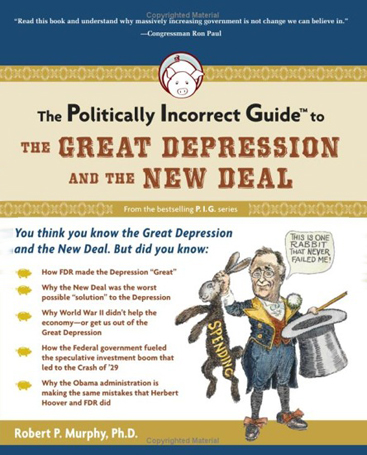|
It was
as if he knew that he was presenting an ideologically charged position as fact—and
he did it anyway, because, in his mind, no other interpretation of the Great
Depression was possible. He and millions like him would benefit immensely from
reading Robert P. Murphy's
The Politically Incorrect Guide to the Great Depression and the New Deal.
 The myth of the Great Depression being caused by laissez-faire capitalism—and
being solved by either the New Deal, World War II, or both—is so prevalent that
in popular-opinion surveys, Franklin Delano Roosevelt routinely appears in the
top five of all US presidents, while the name of Herbert Hoover has become
synonymous with government inaction during an economic crisis. Hundreds of
books, essays, and even works of fiction have been published to challenge these
notions—but somehow the fallacies have prevailed; and they have been eagerly
exploited by the would-be FDRs of the past seven decades.
The myth of the Great Depression being caused by laissez-faire capitalism—and
being solved by either the New Deal, World War II, or both—is so prevalent that
in popular-opinion surveys, Franklin Delano Roosevelt routinely appears in the
top five of all US presidents, while the name of Herbert Hoover has become
synonymous with government inaction during an economic crisis. Hundreds of
books, essays, and even works of fiction have been published to challenge these
notions—but somehow the fallacies have prevailed; and they have been eagerly
exploited by the would-be FDRs of the past seven decades.
For millions of Americans
who have not studied Austrian economics and the Mises/Hayek theory of the
business cycle, or read the brilliant critiques of the New Deal by H. L.
Mencken, Isabel Paterson, Albert Jay Nock, Garet Garrett, and John T. Flynn, the
commonplace myth of laissez-faire as ruinous and FDR as savior appears true,
self-evident, and incontestable. Unfortunately, many of these same people vote
for politicians and policies that promise a "New New Deal." Such a plan would
further exacerbate the current economic crisis, which is fueled by
hyperregulation, Federal Reserve manipulation of the money supply, and the
unforeseen consequences of prior interventions, including the original New Deal.
Murphy's work seeks to
correct popular misunderstandings of the Great Depression by attacking them
directly. Virtually every single commonly encountered assertion—that the
Depression was caused by the excesses of capitalism, that Hoover exacerbated the
Depression by "doing nothing," that the New Deal revitalized economic activity
and mitigated unemployment, and that World War II energized the United States
into recovery—is refuted at length.
In the course of this
debunking, the reader is treated to concise, elegant explanations of the
Austrian theory of the business cycle, the economics of tax reduction, the
virtues of the gold standard and the dangers of fiat currencies, and to
discussions of the errors both in Keynesian prescriptions for deficit spending
and in the Chicago School's suggestion that the Federal Reserve triggered the
Great Depression by failing to inflate sufficiently.
To add flavor to the book
and enable readers to identify with more concrete aspects of the policies it
criticizes, Murphy discusses many of the follies and corruptions of the New
Deal: FDR's use of "lucky numbers" to set the price of gold, the persecution of
the Schechter brothers for defying the National Recovery Administration's
restrictions on poultry production, FDR's attempt to pack the Supreme Court with
his supporters after the court ruled in favor of the Schechter brothers, the
confiscation of private citizens' gold holdings, and the New Dealers' pervasive
use of government funding to bribe and intimidate constituencies into supporting
FDR's policies.
|

